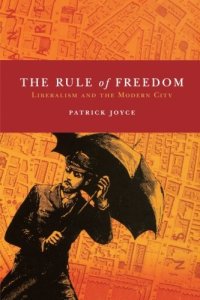
Ebook: The Rule of Freedom: Liberalism and the Modern City
Author: Patrick Joyce
- Tags: Political, Philosophy, Politics & Social Sciences, Democracy, Ideologies & Doctrines, Politics & Government, Politics & Social Sciences, History & Theory, Political Science, Politics & Government, Politics & Social Sciences, Civil Rights & Liberties, Specific Topics, Politics & Government, Politics & Social Sciences, Philosophy, Aesthetics, Epistemology, Ethics, History & Surveys, Logic, Metaphysics, Humanities, New Used & Rental Textbooks, Specialty Boutique, Political History, Political Science, Social Sciences, New Us
- Year: 2003
- Publisher: Verso
- Language: English
- pdf
The liberal governance of the nineteenth-century state and city depended on the “rule of freedom.” As a form of rule it relied on the production of certain kinds of citizens and patterns of social life, which in turn depended on transforming both the material form of the city (its layout, architecture, infrastructure) and the ways it was inhabited and imagined by its leaders, citizens and custodians.
Focusing mainly on London and Manchester, but with reference also to Glasgow, Dublin, Paris, Vienna, colonial India, and even contemporary Los Angeles, Patrick Joyce creatively and originally develops Foucauldian approaches to historiography to reflect on the nature of modern liberal society. His consideration of such “artifacts” as maps and censuses, sewers and markets, public libraries and parks, and of civic governments and city planning, are intertwined with theoretical interpretations to examine both the impersonal, often invisible forms of social direction and control built into the infrastructure of modern life and the ways in which these mechanisms shape cultural and social life and engender popular resistance.
Focusing mainly on London and Manchester, but with reference also to Glasgow, Dublin, Paris, Vienna, colonial India, and even contemporary Los Angeles, Patrick Joyce creatively and originally develops Foucauldian approaches to historiography to reflect on the nature of modern liberal society. His consideration of such “artifacts” as maps and censuses, sewers and markets, public libraries and parks, and of civic governments and city planning, are intertwined with theoretical interpretations to examine both the impersonal, often invisible forms of social direction and control built into the infrastructure of modern life and the ways in which these mechanisms shape cultural and social life and engender popular resistance.
Download the book The Rule of Freedom: Liberalism and the Modern City for free or read online
Continue reading on any device:

Last viewed books
Related books
{related-news}
Comments (0)